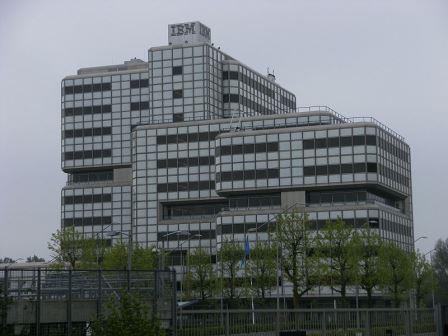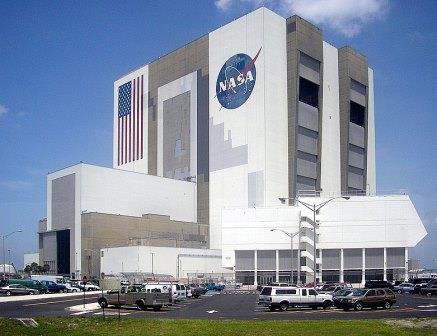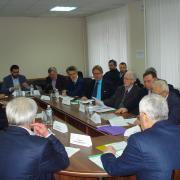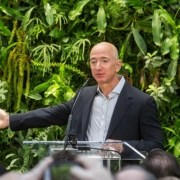A Smarter Planet?
By Herman Daly
“We are capable of shutting off the sun and the stars because they do not pay a dividend.” —John Maynard Keynes, 1933
“Let’s build a smarter planet.” This is IBM’s inspirational slogan, intoned as a benediction at the end of their 2010 advertisements. They do not say, “Let’s make a smarter adaptation to our planet Earth, out of which we were created and by which we are sustained.” It is the planet that is insufficiently smart, not its evolutionary prize-winning, big-brained, star tenant.

IBM claims they want to make a “smarter planet,” yet they refuse to acknowledge the one thing that could help our earth: ending economic growth. (Image: CC BY-SA 2.5, Credit: Mark Ahsmann)
What makes IBM think that the planet is dumb? Well, obviously the mentally challenged Earth does not know how to keep on accommodating our continual economic growth, so we must redesign it with that remedial instruction in mind. For example, our growth requires fossil fuels, but when we burn a lot of them the resulting atmospheric CO2 slows down the radiation of heat back to outer space, heating up the stupid planet and causing dumb climate change. It would be easier to radiate heat energy out and make more thermal room for necessary fossil fuel burning if only we had less solar energy coming in. So a smarter planet would have a higher albedo to reflect more of that troublesome incoming solar radiation. Blasting light-reflecting particles of sulfur into the stratosphere or troposphere should raise the planet’s IQ a great deal.
This sophisticated planet-smartening pedagogy is known as geo-engineering. It will cheaply re-engineer the planet to allow BP to feed the sacred flame of economic growth by drilling deeper holes in more precarious places to pump more oil. That in turn will supply NASA with the resources to build more rockets, thereby to fulfill our cosmic destiny to escape this terminally dumb planet and build a really smart one from scratch in a better location. Scientists have long realized that geo-engineering and other retrofitting measures, while necessary to buy time for building up evacuation capacity, cannot be the final solution for a congenitally moronic planet. And if meanwhile an occasional oil spill reduces the photosynthetic capacity of life in the Gulf of Mexico—well, we have just seen that our silly planet already allows in too much solar energy, so if we reduce that inflow we will not have to trouble ourselves with converting it into food energy. Furthermore when NASA, BP, and IBM finish building our new smart planet, it will contain a new and smarter Gulf of Mexico.

We look to NASA in the hopes of finding a better home instead of trying to save the one we already have. (Image: CC0)
To sum up, by serving only the interests of the growing economy, global corporations like IBM are providentially led, as if by an invisible hand, to also build a smarter planet! Of course, unlike Adam Smith, they do not really believe in any deistic providence with its invisible hand that converts private greed into public good. They know from modern science that random mutation plus natural selection explains everything, and that free will and purpose are illusions. But some of these illusions have survival value and must be persuasively advertised to secure support from the tax-paying masses (science is expensive)—at least until IBM, BP, and NASA have finished building a planet so smart that its inhabitants can safely be dumb robots.
 Herman Daly is CASSE Chief Economist, Professor Emeritus (University of Maryland), and past World Bank senior economist.
Herman Daly is CASSE Chief Economist, Professor Emeritus (University of Maryland), and past World Bank senior economist.





Prof. Daly,
This is a wonderful post! Standing ovation! I have to admit, you had me laughing with the wit of your ridicule. Spot-on! Keep up the great work, I love this new blog.
Cheers,
Joshua
Our planet is the smartest thing there is. Our nature’s living systems, from individual organisms to complex ecosystems, have accumulated 3.85 billion years of evolutionary “research and development experience “. We should be modest and think about nature’s laws before starting taking stuff from it or putting stuff into it. (Friend, 2009). Mr. Daly, you were so right with your three rules regarding (ecological) sustainability.
But here we are also dealing with social sustainability (with structures, processes, people etc) of an organization like IBM, and it is clear that IBM isn’t a sustainability intelligent organization. It needs more knowledge creation and social capital to address its impacts on the world with proper kinds of innovation. Mr. Daly, would you be so kind to (also) formulate your rules on social sustainability (so we can start to measure this as well). We really need these rules too. And thank you, for a great post again.
Be well.
Henk Hadders
Mr. Daly’s putdown of the growth paradim is witty and to the point. Unfortunately debunking the growth paradigm is very easy. A number of 19’th century economists were already writing about the law of diminishing returns associated with extractive industries. A few minutes of thought is sufficientt to explode the myth of everlasting economic growth. Of course one can debate about the timing of the end of growth. It is very comforting to believe that end of growth is a least X decades away where X is longer than your personal life expectancy. But the fact that exponential economic growth must eventually come to and end can be understood in a few minutes by anyone who is not enspelled by the dominant cutural myths. Alas, the group of people who are free of this spell is very small.
Deconstruction of the dominant economic paradigm is easy, but construction of a new paradigm is difficult. The proposals presented on CASSE website seem inadequate to me. Consider for example the proposals for steady state banking institutions. In spite of recommending 100% reserve banking and limiting executive bonuses, the system described is still a form of interest based debt creation. If I loan you purchasing power in the present and expect to receive back a larger amount of purchasing power in the future, the excess purchasing power can come from one of two places: Either total economic production increases or I take purchasing power away from somebody else. Neither of these options an be the basis of a sustainable system of infrastructure investment.
If I put a new roof on my house I do not do so in order to make myself richer. I do so in order to maintain the same level of services that my house is currently providing. In the same way in a steady state economy investments in manufacturing infrastructure will maintain productivity, not increase it. There is no room for interest based investments in such a system. Instead we need a method of creating interest free debt. I would propose a system of community investment, the goal of which is to maintain the productivity of the community rather than to make money for depositors. The people making investment decisions would recieve salaries for services rendered but their compensation would not be tied in any way to the amount of debt which they created. Community investors should be just as much rewarded for the debts they refuse to create as for those that they do create.
I do not think that it is necessary to outlaw private interest based investing, although such forms of investment should be regulated according to some such system as Mr Daly proposes. But a parallel system of interest free debt creation should be instituted anticipating the day when interest producing investments are going be reduced to mere trickle.
I am not claiming, by the way, that a system of interest free debt creation can, in and of itself, fix the problems of our current economic system. One can easily imagine a situation in which the creators of debt are not directly rewarded based on the amount of debt they create, but society as whole is still oriented toward high levels of consumption in the present at the expense of the economic production of the future. Interest free debt creation is a necessary precondition for a sustainble system of economic production but by no means a sufficient one.
It’s easy to mock the corporations, but the truth is that they were born out of our feeding frenzy. We have a primal need for status and instead of fighting for it with tooth and claw we now flaunt possessions and spend extravagantly to signify power and success. Our growing demands for more and more stuff gave rise to planet-eating machinery and multinational companies.
We’re not going to reverse our Darwinian competitiveness in time to prevent irreversible resource depletion, so we urgently need to channel it in new, sustainable directions.
Perhaps we can start to measure wealth not by the clothes we wear or the cars we drive, but by the health we attain and the good friends we have? Should we start judging status in terms of the languages people learn or the art they create? Maybe our prowess at organic gardening or telling jokes will enable us to stand head and shoulders above the rest?
If we’re to rein-in our consumption of energy and materials we’ll certainly need something attractive to fill the vacuum. Our message must be “change” not “stop”.
[…] This post was mentioned on Twitter by Henk Hadders, Keith Johnson and CASSE, Joshua Nelson. Joshua Nelson said: A Smarter Planet? http://bit.ly/cV4685 Herman Dalys’ newest post on “The Daly News” #neweconomy #environment #steadystate #postgrowth […]
Look, if the planet was so smart it would figure out a way to aim its earthquakes and swallow up the corporate headquarters of IBM, BP and Goldman Sachs. Stupid planet!